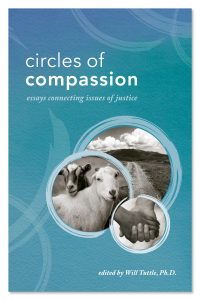Circles of Compassion
 Circles of Compassion
Circles of Compassion
Essays Connecting Issues of Justice
Edited by Will Tuttle, Ph.D.
“Compassion is the path to transformation of consciousness and purification of the human spirit. This important book is an exciting collection of deep reflections about compassion and its celebration of all living creatures who abide equally within the shimmering web of life.” – Elizabeth & Dennis Kucinich
What are the linkages among compassion for animals, social justice, and harmony in our human world?
Circles of Compassion (Vegan Publishers, 320 pages; $22); edited by Dr. Tuttle, consists of a series of essays by internationally recognized authors and activists. These insightful and inspiring essays focus on how the seemingly disparate issues of human, animal, and environmental rights are indeed connected.
Illuminating the connections between injustice to animals and the various forms of social and ecological injustice, these 28 authors provide essential keys to effectively addressing the hidden roots of our dilemmas.
The essays also provide practical guidance about how to make the individual, systems, and social changes necessary to effectively create a peaceful and just world for all. This landmark book provides a crucial impetus for us to break through our confining delusions, build bridges of understanding, and awaken from the cultural trance of indifference and inequity.
Our physical, psychological, social, and spiritual health are all intimately connected, and they can flourish when we understand and live the impassioned insights living in Circles of Compassion.
Circles of Compassion is available through bookstores, online retailers such as Amazon, and signed copies are available from this site. It’s available on Kindle also.
For more information, please read this interview with Dr. Tuttle.
Authors and essays featured in Circles of Compassion :
Carol J. Adams: Foreword: Connecting the Dots
Will Tuttle: Introduction: The Circles of Compassion Vision
David Cantor: Beyond Humanism, Toward a New Animalism
Angel Flinn: No Innocent Bystanders
Katrina Fox: Why Compassion is Essential to Social Justice
Beatrice Friedlander: A Woman, a Cat, and a Realization
Lori B. Girshick: In the Doing and the Being
Rachel Alicia Griffin: Social Responsibility, Reflexivity, and Chasing Rainbows
Robert Grillo: Eating Animals and the Illusion of Personal Choice
Melanie Joy: Carnism: Why Eating Animals is a Social Justice Issue
Lisa Kemmerer: Social Justice, Sincerity, and Sustenance
Rita Laws: Mother Corn, Father Pumpkin, Sister Bean…
Keith Mchenry: Until Every Belly is Full
Christopher-Sebastian McJetters: Slavery It’s Still a Thing
Dawn Moncrief: Hunger, Meat, and the Banality of Evil
David Nibert: Animal Rights Equal Human Rights: Domesecration and Entangled Oppression
Anthony J. Nocella: Building an Animal Advocacy Movement for Racial and Disability Justice
Richard Oppenlander: Our Lifeline Revealed Through the Eye of Justice
Lauren Ornelas: A Hunger for Justice
Colleen Patrick-Goodreau: Veganism: A Path to Non-Violence
Sailesh Rao: Climate Change and Injustice Everywhere
Antenah Roba: Injustice Everywhere
Marla Rose: Becoming a Vegan Feminist Agitator
Ruby Roth: How We Hinder Children to Protect Them
Richard H. Schwartz: Connecting the Dots on Dietary Choices
Kim Sheridan: Looking Behind the Curtain to the Hidden Side of Justice Issues
Jasmin Singer: The Gay Animal: A Personal Exploration of Interconnections
Gary Smith: Animal Rights as a Social Justice Issue
Jo Stepaniak: Confronting the Saboteur Within: Advancing a Consciousness of Compassion
Will Tuttle: Unrecognized Roots of Injustice and the Vegan Transformation
Zoe Weil: The MOGO Principle for a Peaceful, Sustainable, and Humane World
Will Tuttle: Conclusion: Going Forward
“There are a thousand hacking at the branches of evil to one who is striking at the root.” – Henry David Thoreau
“Our food choices are a surprising and overlooked key to understanding our culture and ourselves, and to transforming our world toward harmony and freedom. Speciesism, racism, sexism, ableism, ageism, heterosexism, and classism all spring from reducing certain beings to mere objects who are seen as fundamentally separate from us, and either threats to be managed, or instruments to be used.” – Will Tuttle
“The twin motivations underlying veganism are compassion and justice. As we awaken to the power of understanding this and begin to live it, we directly reduce animal cruelty and suffering. We dramatically reduce our abuse of the Earth, other humans, other species, our loved ones and ourselves, and become a force for positive social transformation.” – Will Tuttle